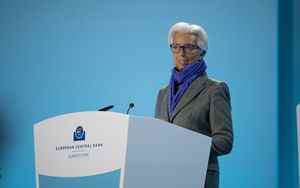(Finance) – After the “out of tune” signals on the future of monetary policy received last week from the restricted directorate of the ECB, tomorrow the president of the Frankfurt institution will take stock of the situation Christine Lagarde. A signal is expected in what is being described as an increasingly close confrontation between hawks and dovish within the ECB’s board. On the one hand, the economic bulletin of the ECB and the president herself reaffirmed their willingness to carry out a new rate increase of 50 basis points at the Governing Council meeting on 16 March, and then to evaluate the subsequent increases on the basis of the data, but in any case counting on bringing rates to a “sufficiently restrictive” level, to be maintained “sufficiently long” to bring inflation down to the target values (2%). On the other Fabio Panetta, who sits on the Executive Committee of the ECB, subsequently intervened with new calls for prudence and more gradual rate hikes. A clash in which it has also entered Isabel Schnabel, member of the Executive Committee of the ECB, stating in a particularly intransigent manner that the hike from 50 basis points in March will be necessary “in any plausible scenario”.
Tomorrow Lagarde he will return to speak with a debate in the evening on a Finnish TV. In the morning, the new surveys on business activity in the euro area (Pmi indices) will be published, which usually also report assessments of the dynamics of inflationary pressures, which the ECB is currently trying to counter with its monetary tightening.
On Wednesday, markets’ attention will return to the Federal Reserve. At 20 Italian time the minutes of the last directorate will be published (Fomc minutes). We will try to gather signals on the orientations of US central bankers, who in recent days seem to have re-launched the bullish rhetoric on rates, also in the light of inflationary dynamics which have indeed shown slowdowns, but less marked than expected. Given that the directorate was carried out before the new data on the labor market and the cost of living strengthened expectations for a more resolute line from the Fed, the tones of the “minutes” – warn the ING analysts – could clash in the sense of moderation with the latest statements from Fed officials.
Thursday finally, Eurostat will release final data on average inflation in the eurozone in January, which could mark a slight upward revision given the late inclusion of the reading on Germany. Subsequently the BCE will publish the statement of the overall balance sheet of the Eurosystem of central banks for the whole of 2022.
